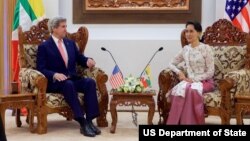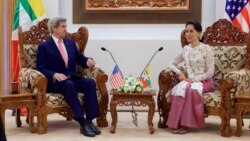On his recent visit to Burma, U.S. Secretary of State John Kerry reiterated strong U.S. support for the democratic transition underway there. Successful nationwide parliamentary elections in November 2015, the inauguration of U Htin Kyaw as Burma’s first civilian president in more than 50 years, and the seating of a new Union Parliament (with more than 100 former political prisoners as parliamentarians) were critical steps forward and extraordinary moments in Burma’s history.
Burma has changed for the better, said Secretary Kerry, and as a result, so has its relationship with the United States. As a consequence, the U.S. has adjusted its sanctions policy in order to promote democracy and encourage broad-based, inclusive economic development. At the same time the U.S. is maintaining some sanctions in order to encourage all institutions, investors, and members of society to support the government’s efforts to consolidate a civilian-led democracy.
In particular, said Secretary Kerry, constitutional reform was needed to further the democratic transition. “It needs to be changed. It needs to be a reflection of how civilian authority is fully respected and how the separation of powers. . .is clearly defined. In addition, there has to be an inclusivity, a resolution of some of the other issues with respect to normal democratic reforms.”
Since 2012, the U.S. has provided $500 million in assistance for civil society, national reconciliation, democracy, respect for human rights and health and food security. The U.S. has supported peace and reconciliation in many parts of the country that have suffered from natural disaster or conflict, including in Rakhine state.
The United States stands with the new Government of Burma as it strives to complete the journey towards full democracy and economic growth and stability that the people of Burma have hoped for so long.

















